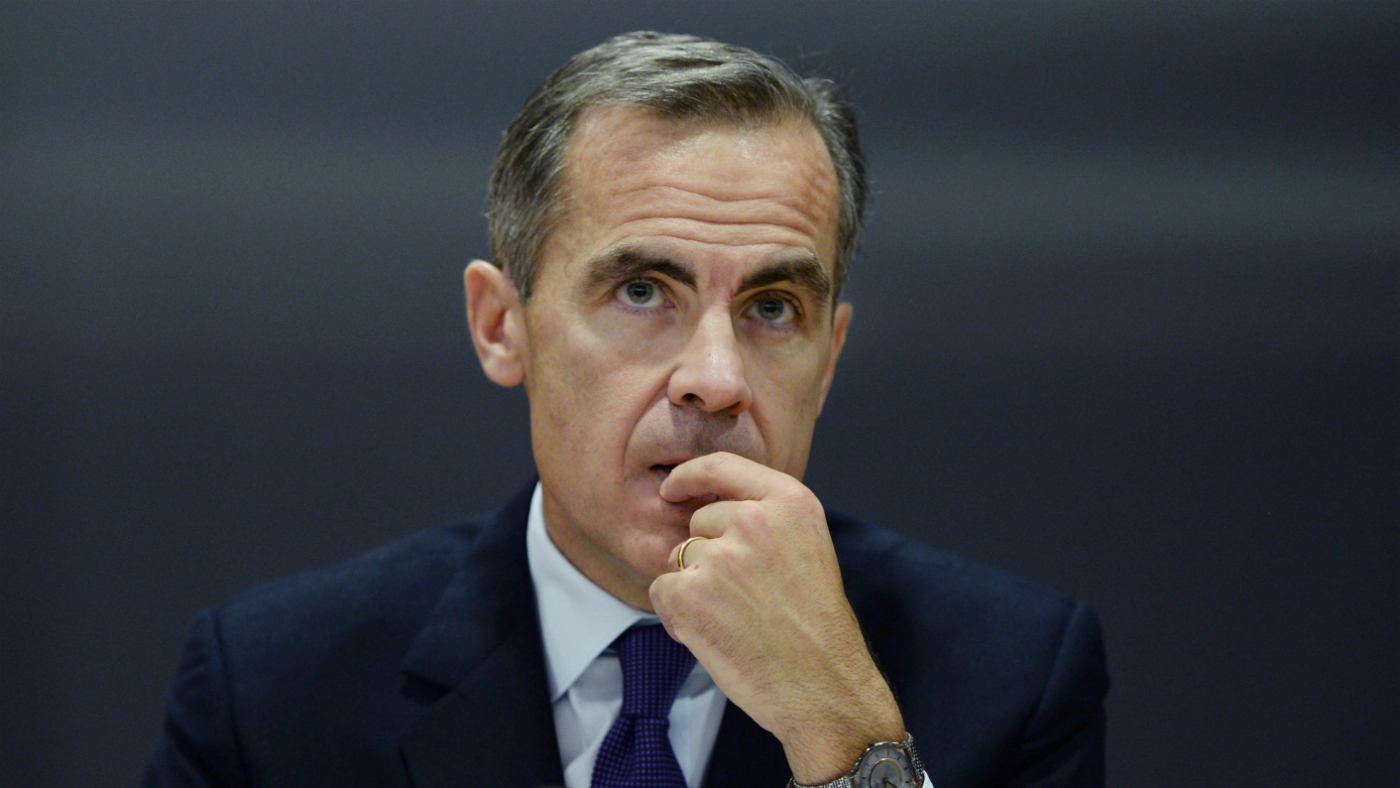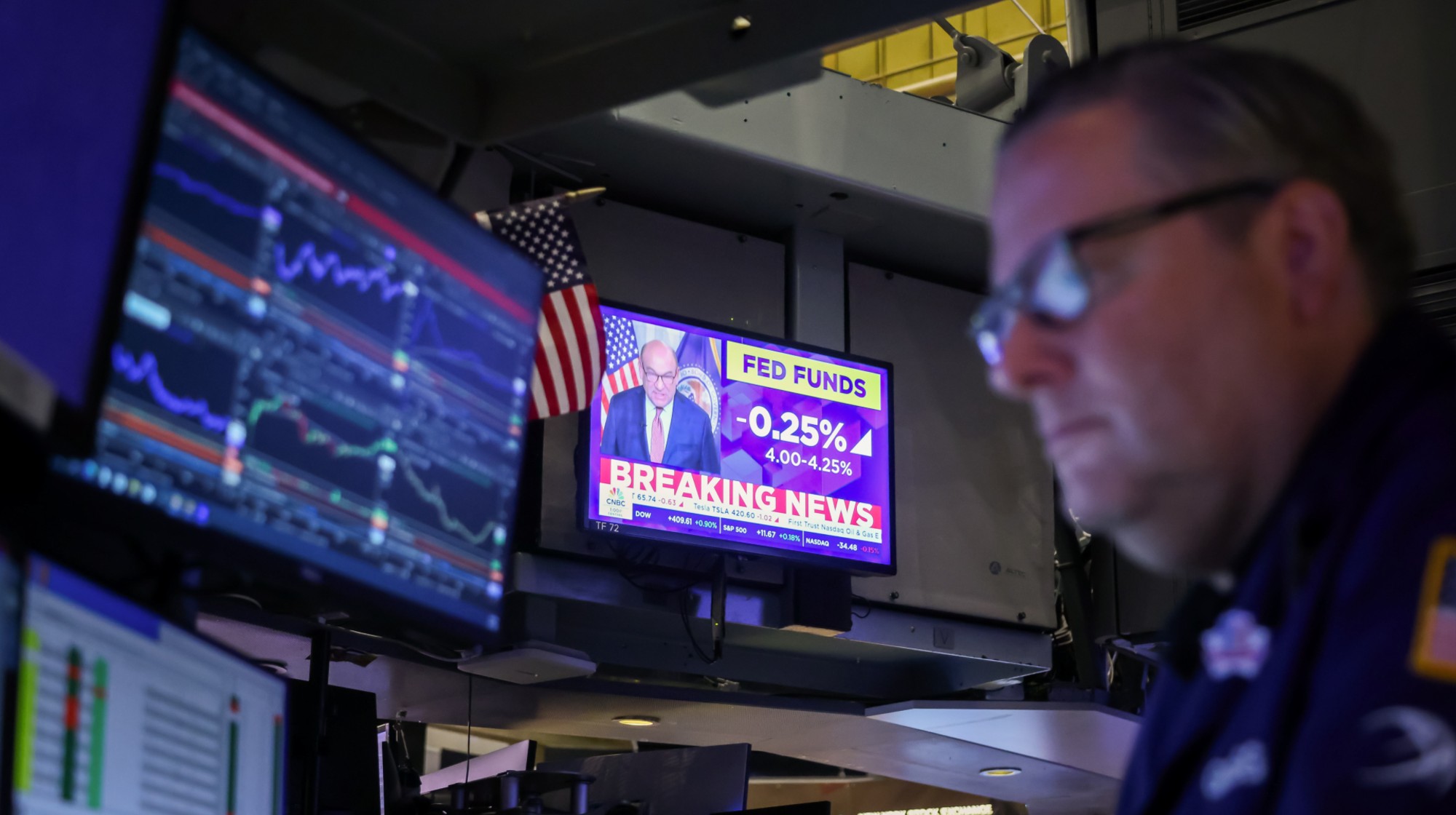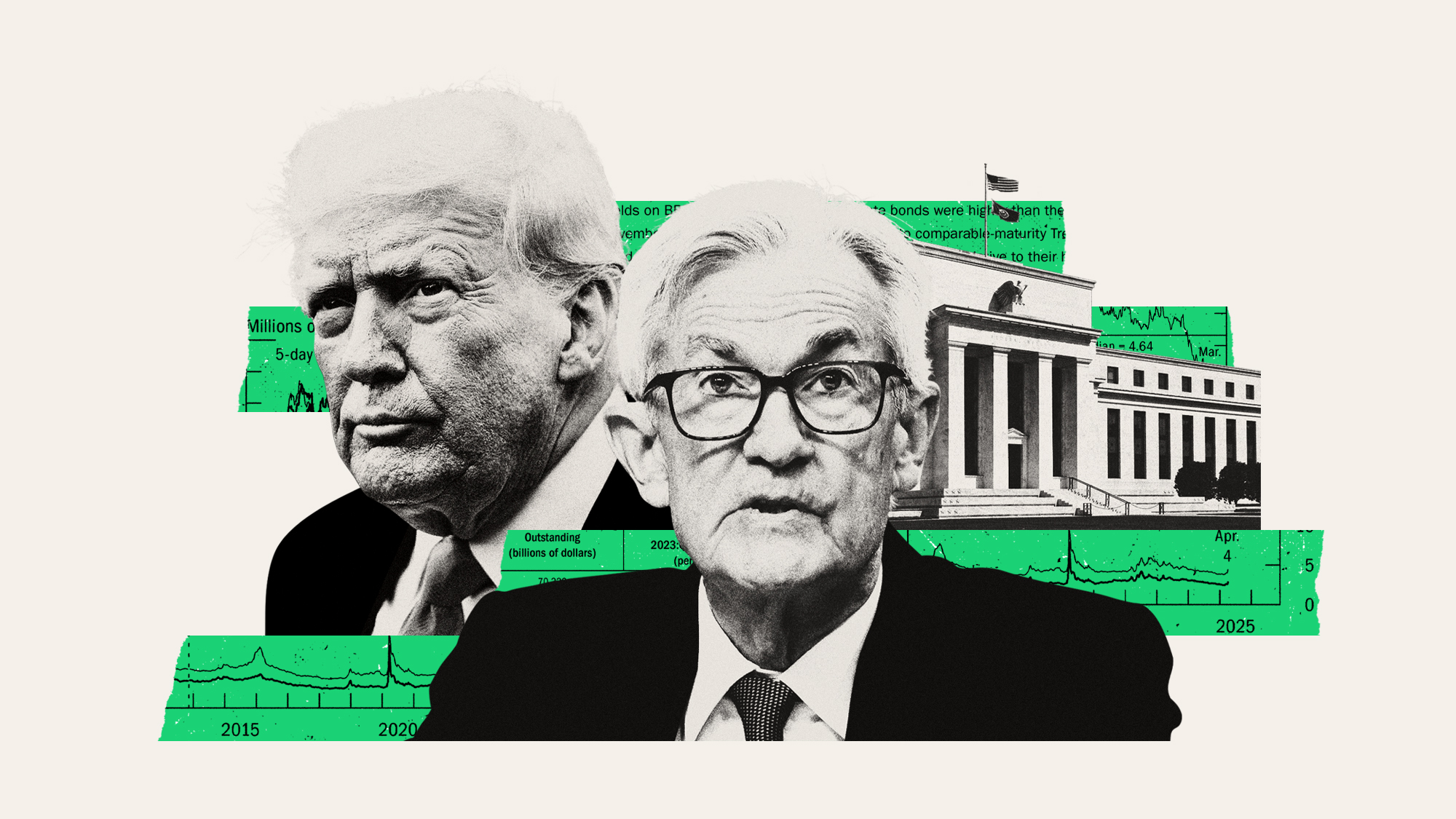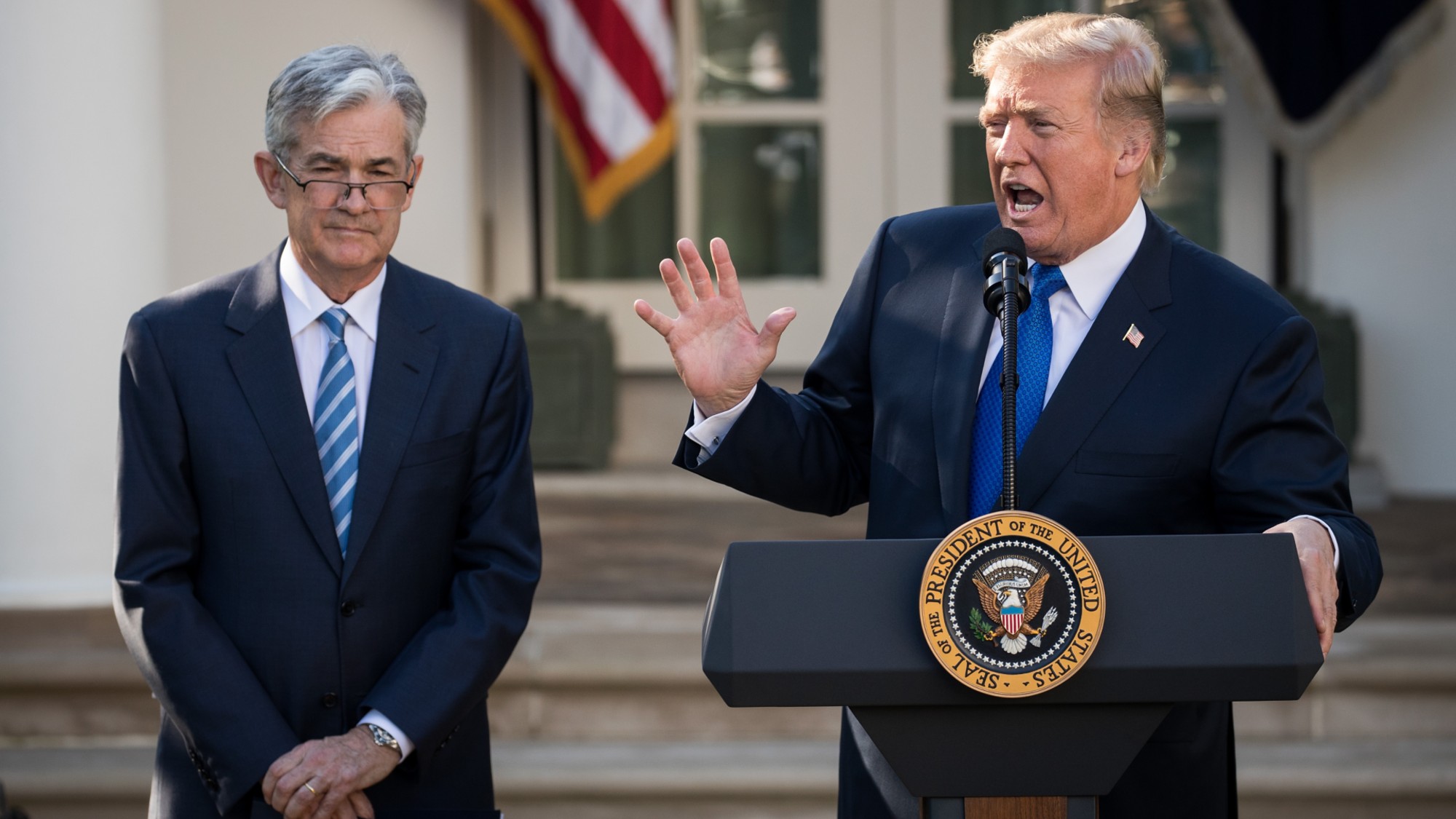Pound plunges after Bank of England's dovish rates signal
Central bank revises its growth forecast for UK economy

A free daily email with the biggest news stories of the day – and the best features from TheWeek.com
You are now subscribed
Your newsletter sign-up was successful
Sterling fell sharply this afternoon after the Bank of England delivered a dovish message on interest rates in its latest "Super Thursday" publications.
The UK central bank's Monetary Policy Committee voted by six to two to hold the base interest rate at its record low of 0.25 per cent for another month.
The decision represents a stronger vote against a rates rise than the five to three split at the bank's last meeting in June. Later that month, noted hawk Kristin Forbes stepped down from the rate-setting panel.
The Week
Escape your echo chamber. Get the facts behind the news, plus analysis from multiple perspectives.

Sign up for The Week's Free Newsletters
From our morning news briefing to a weekly Good News Newsletter, get the best of The Week delivered directly to your inbox.
From our morning news briefing to a weekly Good News Newsletter, get the best of The Week delivered directly to your inbox.
Alongside the rates decision, the bank has published its inflation report. This includes a downward revision to the forecast for economic growth for the whole of this year, from 1.9 per cent to 1.7 per cent.
Previous updates upped the projected rate of expansion, but the reversal still means the bank is predicting a modest pick-up in growth for the second half of this year.
The report is in line with forecasts from the National Institute for Economic and Social Research and the International Monetary Fund.
Governor Mark Carney warns that the current market bet of just two interest rate rises over the next three years will be "insufficient", but traders are interpreting the publications as marking a hawkish shift.
A free daily email with the biggest news stories of the day – and the best features from TheWeek.com
This has prompted them to sell off the pound, which by a little after 1.30pm was down 0.85 per cent and 0.8 per cent respectively against the dollar and the euro, says the Daily Telegraph.
Sterling, though, is coming off an 11-month high and remains more than a cent above the $1.30 threshold it was stuck beneath between October last year and May of this year.
Carney says Brexit is already hitting the UK economy as business investment "has been weaker than we otherwise would have expected" and this is slowing down the "speed limit" of the economy, says the BBC.
But Carney insists the economy still boasts "major strengths", including a "rock solid" financial sector and very low unemployment.
Bank of England warns about rise in personal debt
25 July
The Bank of England has warned against a rising tide of household debt after levels jumped over the past year.
It has told credit card companies, car loan providers and banks it could take action on reckless lending amid a looming "spiral of complacency", The Guardian reports.
Credit card debt, personal borrowings and car loans have risen by ten per cent over the last year, said Alex Brazier, Bank of England director for financial stability, in a speech in Liverpool. However, household incomes have only grown by 1.5 per cent over the last year.
"Lending standards can go from responsible to reckless very quickly. The sorry fact is that as lenders think the risks they face are falling, the risks they – and the wider economy – face are actually growing," Brazier added.
His remarks showed "a ratcheting up of Threadneedle Street's rhetoric", The Guardian says, as the bank sounds the alarm over a possible re-run of the financial crisis which unfolded a decade ago.
Carney's hawkish hint sends pound to post-election high
29 June
The pound has risen to its highest level since the day of the general election after Mark Carney appeared to soften his opposition to an interest rate rise.
Speaking to a conference of global central bankers in Portugal yesterday, the Bank of England governor set out the conditions that could persuade him to vote in favour of increasing borrowing costs.
The decision would become more "conventional" if falling consumer demand is shown to be "offset" by other economic stimulus, such as investment by businesses, he said.
He also told the bankers he would look for signs that wages and cost of labour more generally had begun to "firm".
Following his comments, the pound rebounded from levels of around $1.27 against the dollar earlier this week to $1.298 this morning.
It was last above $1.29 on 9 June, before the general election result, and has not hit more than $1.30 since mid-May.
Carney still broadly reiterated a "wait and see" approach to rate setting, says The Guardian, and echoed his statements from last week that the way the economy reacts to the "reality of Brexit negotiations" will be key.
Those comments were interpreted as a sign rates would not increase until Brexit trade discussions made meaningful progress, which would be well into 2018.
However, by clarifying that he sees a scenario where rates could rise sooner than later - and emphasising "limited tolerance for above-target inflation, says Sky News - he was sounding a more hawkish note.
This month's meeting of the bank's rate-setters saw three members vote for an increase for the first time since 2011, although all five Bank of England policymakers voted against any change.
However, there has been a split in rhetoric from Bank committee members since then.
Chief economist Andy Haldane said he was edging closer to voting for a rise, while deputy governor Sir Jon Cunliffe said yesterday he thinks they have "a bit of time" to see how economic trends play out.
Bank of England 'behind the curve' on raising interest rates
23 June
There is a "degree of urgency" about the Bank of England starting the process of raising interest rates, says an outgoing member of the monetary policy committee (MPC).
Kristin Forbes, a professor at the Massachusetts Institute of Technology who is stepping down from the committee at the end of this month, told an audience at the London Business School she was concerned that inflation is running close to three per cent and will probably remain above the target of two per cent for "at least three years", says the Daily Telegraph.
At the same time, pay growth is below two per cent and real wages are in decline.
While policy decisions must take account of the impact on the wider economy, Forbes said that with unemployment low and growth steady, albeit slowing, there were signs the "economy is solid enough on key... criteria".
In fact, she added, by some measures it was "overstimulated" and she warned there would be ill-effects associated with keeping rates low, such as asset bubbles in housing and funding gaps for pension funds.
In this respect it could be argued the UK is "behind the curve", she added, especially compared to the US, where the Federal Reserve has increased rates four times since December 2015.
Forbes suggested the bank's reluctance to raise rates was related to a change in policy in 2013 to focus on wider growth. Since then, she said, no internal member of the MPC had dissented on a vote.
However, this could change soon. Andy Haldane, chief economist at the Bank of England and a member of the committee, also said this week he was edging closer to voting for a rates increase in the second half of this year.
On Tuesday, Bank of England governor and committee chair Mark Carney said he felt there would not be a case for an interest rates increase until the post-Brexit trade deal was clearer.
Forbes was one of three members to vote for a rates rise this month in the biggest committee split since 2011. She has voted for a change in policy consistently in each of the last three meetings.
Carney's dovish interest rates stance sends pound lower
20 June
Last week, all the talk was of how an interest rate rise in the UK might be coming down the line sooner than people expect.
That was because the Bank of England's monetary policy committee (MPC), an eight-member panel that sets interest rate policy, was more split over its latest decision to hold rates than at any point for six years.
Now Bank of England governor Mark Carney, a prominent member of the committee, has sounded an extremely dovish tone and said the path of Brexit needs to be much clearer before he would vote for a rates hike.
Speaking to City executives at the Mansion House in London, Carney said he would like to see how consumer spending, business investment and wage growth and economy more widely responds to "the reality of Brexit negotiations", says The Guardian.
He added: "Before long, we will all begin to find out the extent to which Brexit is a gentle stroll along a smooth path to a land of cake and consumption."
Given the nature of the negotiations, which are focusing on the so-called "divorce bill" first before moving on to ongoing arrangements, it will be many months before we have any clarity.
As the four other Bank staffers on the panel have tended to vote "en bloc", this could suggest rates will not move at least until well into next year, when the future relationship between the UK and EU may have begun to take shape.
The pound, which tends to rise when rates are higher as a result of an expected increase in foreign investment, fell 0.7 per cent to less than $1.265 following Carney's speech.
Elsewhere, and also potentially suggesting that an interest rates hike is not coming soon, a new MPC member was announced today - and the Guardian says economists believe she will be less likely to vote for a rise.
Silvana Tenreyro, a professor at the London School of Economics who was strongly against the UK leaving the European Union, replaces economist Kristin Forbes, who was one of the three MPC members to vote for a rates rise last week.
Does 5-3 split at Bank of England mean interest rates will rise?
12 June
Your mortgage repayments - and the interest you earn on your savings - could be set to rise from rock-bottom rates sooner than you think.
The Bank of England's eight-member monetary policy committee (MPC) today declared a "shock" 5-3 split on raising rates, says Sky News, with external members Kristin Forbes, Ian McCafferty and Michael Saunders calling for them to increase 0.25-0.5 per cent
While the committee wasn't expected to increase rates given the precarious position of the economy, the vote was expected to be unchanged at 7-1, with only Forbes the lone hawk.
It's the first time three members of the MPC have voted for an increase since May 2011, giving rise to speculation that rates could go up for the first time since July 2007.
The key issue is inflation, which has been above the bank's two per cent target for months and this week was revealed to have hit 2.9 per cent, above its forecasted 2017 peak.
Wages are rising at just 1.7 per cent, which means that in real terms they are falling, putting pressure on household budgets.
According to the minutes of the MPC meeting: "Inflation was projected to overshoot the target by more than previously expected and to remain above it throughout the three-year forecast period."
Ben Brettell, senior economist at Hargreaves Lansdown, said: "It seems the willingness of the MPC to 'look through' higher inflation and leave rates on hold is wearing thin."
But The Guardian believes the chances of rates rising are not as close as the split vote might imply – and Barclays is still predicting it won't happen until 2019.
The vote may look close, but with five Bank of England staffers on the panel and consistent rates hawk Forbes stepping down after this week's meeting, there is no obvious sign of majority support for a policy change.
Amid signs that the economy is slowing down and wages are stuck in a rut, many believe the bank won't dare increase borrowing costs just yet and that to do so would be to deliver the wrong medicine.
US Federal Reserve expected to raise rates this week
12 June
Policymakers on the US Federal Reserve are widely expected to approve the second interest rate increase for the year so far at their two-day meeting starting tomorrow.
"The US Federal Reserve is expected to raise its federal funds target to between one per cent and 1.25 per cent, from 0.75 per cent to one per cent," says the Daily Telegraph.
Base interest rates across the Atlantic are set using the Federal Reserve funds rate, which is the amount banks and other institutions charge each other to borrow money held at the central bank.
It influences the interest on a range of credit products such as mortgages and personal loans and is an important benchmark in financial markets.
After being on hold at record lows since the financial crisis, the first increase in nine years came in December 2015.
Rates next went up in December 2016 and again in March this year, but they are still low and normalisation is projected to take a long time.
March's meeting also saw the Fed suggest it was on course for three increases this year, which suggested a rise this month and another at the autumn meeting.
That is now the key question for most traders: will the Fed's statement on Wednesday suggest a third rise this year remains likely?
"Watch for the expression 'dovish hike'. It's a term that Fed geeks apply when the central bank raises rates but issues caution about the economic landscape and indicates a slow pace ahead for further increases," says CNBC.
Seth Carpenter, an economist at UBS, told the Telegraph a "softer-than-expected inflation report could put the September rate hike at risk".
Recent economic data has been sluggish, with first quarter growth at its slowest since early 2016 and jobs growth slowing markedly last month.
However, unemployment is at a 16-year low of 4.3 per cent, suggesting the economy is close to "full employment", although this is yet to feed into faster wage growth, which is keeping a lid on inflation.
Trump: I do like a low-interest rate policy
13 April
Donald Trump has done a major about-face on monetary policy to say he now supports low interest rates.
In an interview with the Wall Street Journal, the US President said: "I do like a low-interest rate policy, I must be honest with you".
However, on the campaign trail last year, Trump was very outspoken on rates and how ultra-low rates have created a "false economy".
Speaking in September, he said: "They're keeping the rates down so that everything else doesn't go down."
Trump's latest comments came in the wake of data showing the US economy is continuing to make gains, with unemployment still well below five per cent and wage growth holding up at an above-inflation 2.7 per cent.
The interview, which also included further U-turns on Chinese currency "manipulation" and Federal Reserve chairwoman Janet Yellen, sent the dollar lower last night.
Trump's reversal on the Fed chief adds to the sense of supporting currently accommodative monetary policy.
On the campaign trail, in comments The Guardian says were "a lightning rod to savers", Trump accused Yellen of "being political", essentially suggesting that the Fed's low-rates policies were designed to help then Democrat president Barrack Obama.
But he told the WSJ that the chairwoman was "not toast", adding: "I like [Yellen], I respect her… It's very early."
Yellen's time in charge of the Federal Reserve is set to expire next February, but Neil Dutta, an economist at Renaissance Macro, said Trump's comments meant she could remain in the post.
He told Yahoo Finance: "Nationalism is giving way to pragmatism. I think the odds of Janet Yellen being here next year are rising and I do think that is bullish for risk appetite."
-
 The environmental cost of GLP-1s
The environmental cost of GLP-1sThe explainer Producing the drugs is a dirty process
-
 Greenland’s capital becomes ground zero for the country’s diplomatic straits
Greenland’s capital becomes ground zero for the country’s diplomatic straitsIN THE SPOTLIGHT A flurry of new consular activity in Nuuk shows how important Greenland has become to Europeans’ anxiety about American imperialism
-
 ‘This is something that happens all too often’
‘This is something that happens all too often’Instant Opinion Opinion, comment and editorials of the day
-
 Powell: The Fed’s last hope?
Powell: The Fed’s last hope?Feature Federal Reserve Chairman Jerome Powell fights back against President Trump's claims
-
 The end for central bank independence?
The end for central bank independence?The Explainer Trump’s war on the US Federal Reserve comes at a moment of global weakening in central bank authority
-
 Who will be the next Fed chair?
Who will be the next Fed chair?Today's Big Question Kevin Hassett appears to be Trump’s pick
-
 Should Labour break manifesto pledge and raise taxes?
Should Labour break manifesto pledge and raise taxes?Today's Big Question There are ‘powerful’ fiscal arguments for an income tax rise but it could mean ‘game over’ for the government
-
 What are stablecoins, and why is the government so interested in them?
What are stablecoins, and why is the government so interested in them?The Explainer With the government backing calls for the regulation of certain cryptocurrencies, are stablecoins the future?
-
 Fed cuts interest rates a quarter point
Fed cuts interest rates a quarter pointSpeed Read ‘The cut suggests a broader shift toward concern about cracks forming in the job market’
-
 Trump's threats to fire Jerome Powell are unsettling the markets
Trump's threats to fire Jerome Powell are unsettling the marketsTalking Points Expect a 'period of volatility' if he follows through
-
 How will Wall Street react to the Trump-Powell showdown?
How will Wall Street react to the Trump-Powell showdown?Today's Big Question 'Market turmoil' seems likely